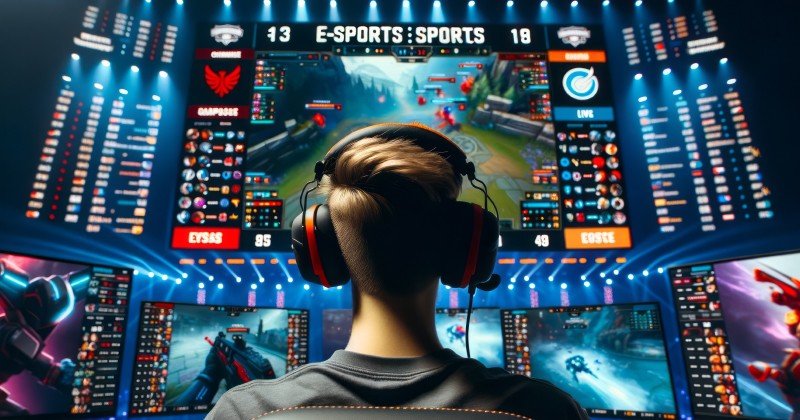Let us explore The psychology of esports betting, Esports, or electronic sports, have exploded in popularity in recent years. With professional gamers competing for millions of dollars in prize pools, it’s no surprise that esports betting has followed suit. But what drives people to wager on these virtual matchups? The answer lies deep within the complex world of the psychology of esports betting.
Financial Gain and Enhancement
Like traditional sports betting, the desire for financial gain is a significant motivator. The possibility of turning a small bet into a significant windfall can be incredibly enticing. This allure is particularly strong for younger demographics, a core audience for esports. However, research suggests that focusing solely on financial gain within the psychology of esports betting can be a slippery slope. Studies have linked this motivation to a higher risk of problem gambling.
Beyond pure financial gain, the psychology of esports betting explores the concept of enhancement. Betting can add an extra layer of excitement to watching a match. The thrill of potentially winning alongside your favorite team or player creates a more immersive and engaging viewing experience. This heightened emotional state is a key driver of esports betting participation.

Fan Loyalty and the In-Group Bias
Esports fans often have strong allegiances to specific teams, players, or games. This fan loyalty plays a significant role in the psychology of esports betting. Fans are more likely to bet on teams they support, even if the odds are not necessarily in their favor. This phenomenon is known as the in-group bias, where individuals favor their own group over others. In the context of esports betting, this can lead to biased decision-making, potentially overlooking a better betting opportunity on a rival team.
The psychology of esports betting
Humans have a natural desire for control. The psychology of esports betting taps into this desire by offering the illusion of control over the outcome of a match. By placing a bet, viewers feel more invested in the game’s flow and potentially believe their wager can influence the results. This, however is a cognitive bias known as the gambler’s fallacy. The outcome of each match is independent of previous events, regardless of past wins or losses.
Esports Knowledge and Overconfidence
Esports fans with deep knowledge of the games, teams, and players might feel overly confident in their ability to predict outcomes. This overconfidence, stemming from the familiarity with the esports scene, can be a significant factor in the psychology of esports betting. While knowledge is certainly an advantage, unexpected upsets and unpredictable in-game moments can easily derail even the most well-informed bets.
Chasing Losses and the Sunk Cost Fallacy
Losing a bet can be frustrating. However, the psychology of esports betting can lead some individuals to fall victim to the sunk cost fallacy. This cognitive bias occurs when people continue to invest resources (in this case, money) into a losing proposition simply because they’ve already invested something in the past. This can lead to a dangerous cycle of chasing losses, potentially leading to significant financial problems.
Community and Belonging
Esports betting often involves a social element. Friends may place bets together, adding a layer of competition and camaraderie to watching matches. Online forums and communities dedicated to esports betting can further fuel this social aspect. While this can be a positive way to connect with like-minded individuals, it’s crucial to remember that these communities can also normalize excessive betting behavior.
Responsible Gambling and Recognizing Risks
Understanding the psychology of esports betting is essential for responsible participation. Here are some key points to remember:
- Set a budget: Determine a specific amount you’re comfortable losing and stick to it.
- Focus on entertainment, not wealth generation: View esports betting as a way to add excitement, not a guaranteed path to riches.
- Don’t chase losses: Accept that some bets will be lost, and avoid placing further bets to recoup those losses.
- Take breaks: Don’t get caught up in the constant cycle of betting. Take breaks and avoid compulsive behavior.
- Seek help if needed: If you find yourself struggling to control your esports betting habits, seek professional help from organizations specializing in gambling addiction.
The Future of Esports Betting
As the esports industry continues to grow, so too will esports betting. It’s crucial that the industry promotes responsible gambling practices while educating users about the psychology of esports betting. This includes clear age verification, setting deposit limits, and readily available resources for problem gamblers. By fostering a responsible and sustainable environment, the esports betting industry can ensure a positive and enjoyable experience for all participants.
The psychology of esports betting is a complex interplay of emotions, cognitive biases, and a desire for excitement. By understanding these factors, both individuals and the esports betting industry can navigate this growing space responsibly. Promoting responsible gambling practices, fostering ethical marketing strategies, and implementing strong regulations are all vital steps in ensuring a safe and enjoyable experience for esports fans and bettors alike.
As the psychology of esports betting continues to be explored, a commitment to education, responsible practices, and user safety will be paramount in ensuring a positive future for this rapidly evolving industry. Here’s a vision for a collaborative approach:

- Esports organizations: Integrating responsible gambling messages into their platforms and events, potentially partnering with mental health professionals to raise awareness.
- Betting companies: Prioritizing ethical marketing practices that focus on the entertainment value of esports alongside responsible gambling resources.
- Regulatory bodies: Implementing and enforcing clear regulations to protect consumers, including age verification, data privacy measures, and ensuring fair practices within the industry.
- Mental health professionals: Providing resources and support for individuals struggling with gambling addiction, potentially collaborating with esports organizations and betting companies to develop educational materials.
By working together, these entities can build a sustainable and responsible esports betting ecosystem that prioritizes both the thrill of the competition and the well-being of fans. As the future of esports betting unfolds, a focus on the psychology of esports betting will ensure a positive and responsible experience for all participants.
Trust you found our article on “The psychology of esports betting” helpful please follow our website for more insightful content like this

